| |
Heart Attack Patients Now Have Better Chance of Survival
New System Dramatically Speeds Up Time for Administration of Lifesaving Procedure.

Supervisor Greg Coxspeaks at news conference announcing results of Cardiac System of Care.
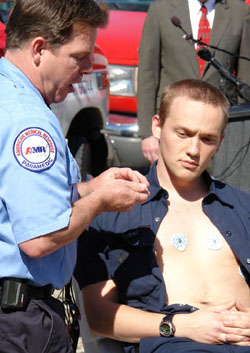
Paramedic Paul Maxwell (left) demonstrates 12-lead electrocardiogram (EKG) equipment on Paramedic Intern Matt Lindsey. |
Elected and public health officials will be joined by local cardiologists and paramedics to announce and demonstrate a new system that has significantly improved a patient’s chance of surviving a heart attack.
Chairman Greg Cox will unveil the results of a system implemented a year ago that dramatically improves the time heart attack victims wait for potentially lifesaving treatment. The system enables paramedics in the field to better identify a specific type of heart attack by using 12-lead electrocardiogram (EKG) equipment. The system has reduced the wait time for catheterizing patients – the process of opening clogged arteries – almost in half.
Heart attack patients now have a better chance of survival thanks to a recent collaboration between the County of San Diego Health and Human Services Agency and the local healthcare community. The Cardiac System of Care dramatically improves the time before heart attack victims receive potentially lifesaving treatment.
The County worked with local cardiologists and hospitals to develop the new system, which enables paramedics in the field to better identify the most life-threatening type of heart attack by using 12-lead electrocardiogram (EKG) equipment. The system, implemented in January 2007, has cut the time for catheterizing patients – the process of opening clogged arteries – almost in half.
Participating hospitals include:
Alvarado Hospital; Naval Medical Center, San Diego; Palomar Medical Center; Scripps Memorial Hospital, La Jolla; Scripps Mercy Hospital; Scripps Mercy Hospital, Chula Vista; Scripps Memorial Hospital, Encinitas; Sharp Chula Vista Medical Center; Sharp Grossmont Hospital; Sharp Memorial Hospital; Tri-City Medical Center; UCSD Medical Center, Hillcrest; and UCSD Thornton Hospital.
For more information on the Cardiac System of Care, please call (619) 285-6429.
Tuberculosis case reported at Taft Middle School
...HHSA, School Officials Notifying Students, Faculty and Staff; Testing Offered
The County of San Diego Health and Human Services Agency (HHSA) is working with Taft Middle School (San Diego) officials to notify classmates, faculty and staff who were possibly exposed to tuberculosis (TB). A student who attended classes from Nov. 1, 2007 to March 13, 2008 has been diagnosed with TB.
“It is important for the public to know TB is in our community,” says Wilma Wooten, M.D., M.P.H., County Public Health Officer. “TB is spread through the air, when a person infected with TB coughs or sneezes. It takes prolonged contact with a TB patient to get it.”
HHSA TB Control and Taft Middle School staff have identified approximately 200 people, including students, faculty and staff that were potentially exposed and are sending letters to students and parents today. Testing will be conducted on campus the week of March 31.
Tuberculosis is not uncommon in the San Diego region. In 2007, there were 280 total cases of tuberculosis in San Diego County. Symptoms of active TB include persistent cough, fever, night sweats and unexplained weight loss. Most people who are exposed to TB do not develop the disease.
Individuals with no medical provider, or anyone who would like more information, may call the County TB Control Program at (619) 692-8621.
Plasma Collection Center TB is Multi-drug Resistant Strain
Strain is Treatable; HHSA, Center Working to Notify Clients, Staff
The County of San Diego Health and Human Services Agency (HHSA) is working with Life 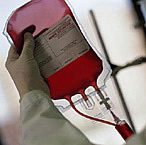 Sera Plasma Collection Center officials to notify clients and staff who may have been exposed to a multi-drug resistant strain of tuberculosis (TB). This case, at Life Sera Plasma Center in Hillcrest, was reported earlier this month by HHSA. Sera Plasma Collection Center officials to notify clients and staff who may have been exposed to a multi-drug resistant strain of tuberculosis (TB). This case, at Life Sera Plasma Center in Hillcrest, was reported earlier this month by HHSA.
An individual who was at the Plasma Center (6th Ave location) from July 1, 2007 to Feb. 18, 2008, Sunday – Friday, has been confirmed to have a strain of TB that is resistant to two of the most commonly used drugs to treat the illness, Isoniazid and Rifampin. This form of TB is generally referred to as multi-drug resistant TB or MDR-TB.
“The treatment regimen for MDR-TB takes longer, because patients must take special drugs to cure the disease,” said Wilma Wooten, M.D., M.P.H., County Public Health Officer. “We urge patients with TB to finish all of their TB medicine. Not completing the treatment regimen can result in the strain becoming multi-drug resistant.”
“Life Sera Plasma Collection Center is cooperating to the fullest extent possible with HHSA,” said a Life Sera spokesperson. “The Center strives to protect the health and welfare of its clients and staff, and supports the efforts of HHSA to promote public health.”
Tuberculosis is not uncommon in the San Diego region. In 2007, there were 280 total cases of TB in San Diego County and 28 have been reported so far in 2008. Each year, 1 – 2 percent of these overall cases are multi-drug resistant. A TB skin test is generally the first step in evaluating whether a person has been affected.
Clients are urged to see their personal physician. Individuals with no medical provider, or anyone who would like more information, may call the County TB Control Program at (619) 692-8621.
Symptoms of active TB include persistent cough, fever, night sweats and unexplained weight loss. Most people who are exposed to TB do not develop the disease.More information about Tuberculosis and Questions and Answers about Plasma donation
Mental Health Walk-In Clinic Opens in Vista
...North County Facility Can Serve More Than 1,500 Patients Yearly
North County residents suffering from a mental illness will be able to show up and see a counselor immediately at a Vista walk-in clinic thanks to the San Diego County Health and Human Services Agency (HHSA).
....The Exodus Recovery Mental Health Walk-In Assessment Center is located at 524 West Vista Way. The urgent mental health clinic will begin providing services Monday through Friday from 12 Noon to 8:00 p.m., starting March 11, 2008. An official opening ceremony will take place at 11 a.m.
....“This is great news for North County residents in need of mental health treatment,” said Alfredo Aguirre, Director of HHSA’s Mental Health Services division. “Mental health professionals will assess the severity of consumers’ mental illness and refer them to appropriate services, increasing access to urgent psychiatric evaluations and reducing use of emergency and inpatient services.”
....The new program will offer several mental health services, including crisis intervention, substance use assessment, domestic violence screenings, medication and case management, information and referrals to community-based services.
....Another innovative component of the Walk-In Assessment Center is the use of telepsychiatrythe use of communications technology to speed up mental health service deliverysaving patient and professional time, as well as travel costs.
Services are being provided thanks to a $1 million budget from the Mental Health Services Act.
....The assessment center will serve 1,560 unduplicated consumers, 18 years and older, annually. Priority will be given to people who are indigent or receive MediCal. Individuals with other health care coverage may be referred to alternate resources and services.
....Approved by California voters in 2004, the Mental Health Services Act imposes a one percent tax on personal income above $1 million for the creation of new mental health programs statewide.
....To obtain more information on mental illness or to seek services, call the County’s multi-lingual Access and Crisis Line at (800) 479-3339.
Wanted Participants with Diabetes for a Panel Program in San Diego
...Did you go through a long period of time when you were taking poor care of your  diabetes? diabetes?
Do you now feel more fully engaged with your diabetes care? If so, we would like to hear your story.
Most people have not always found diabetes care to be easy, and many ignored or were disengaged from their own diabetes care for many years, and then - - - something clicked. Something happened and then - - - perhaps in an instant or perhaps over a series of events, they had a change in perspective, suddenly realizing that diabetes care was truly worth their time and effort.
But what happened? If we could better understand what "clicked", the magic ingredient that helped to inspire people like you, then we could find a way to pass it on to those many people who will otherwise never find the road back to good care.
Sound familiar? If you have a "something clicked" story, live in the San Diego area, and might be willing to be part of an evening panel presentation for health care professionals as well as other people with diabetes, please contact Dr. Susan Guzman at the Behavioral Diabetes Institute at sjg@beha vioraldiabetes.org.
FDA Public health advisory to alert patients, caregivers, and healthcare professionals to important information on the safe and appropriate use of Tussionex.
...Tussionex is a prescription cough medicine containing hydrocodone and the antihistamine
....U.S. health officials issued an alert about reports of life-threatening side effects and 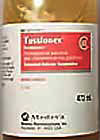 deaths linked to inappropriate use of UCB's prescription cough medicine Tussionex. deaths linked to inappropriate use of UCB's prescription cough medicine Tussionex.
.....The Food and Drug Administration said the reports indicate doctors sometimes are prescribing, and patients sometimes taking, more than the recommended dose of Tussionex Pennkinetic Extended-Release Suspension.
.....Some people also are taking the drug more frequently than every 12 hours, the recommended time interval, or giving it to children under age 6, the FDA said. Tussionex is not approved for children younger than 6.
.....The FDA said it had received numerous reports of health problems and deaths among children and adults who took Tussionex, which contains the narcotic pain reliever hydrocodone. Too much hydrocodone can cause life-threatening breathing problems.
Five deaths have been reported among children under 6 who took Tussionex since its approval in 1987, UCB spokesman Eric Miller said on Friday. He said then that UCB has proposed a stronger warning for the medicine following the reports of the deaths. He could not immediately be reached on Tuesday.
.....The FDA urged doctors and patients to follow prescribing instructions and to only use a medical syringe or other device designed to measure liquid medications. Household spoons vary in size and should not be used, the FDA said.
....."There is a real and serious risk for overdosing if this medication is not used according to the labeling," Dr. Curtis Rosebraugh, acting director of the FDA office that regulates prescription cough medicines, said in a statement. More information related to cough medicine
West Nile Virus Detected Locally Earlier than Ever Before
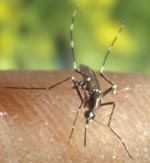
....“West County Says Last Year’s Infection Rates Show Residents Over 50 at Greatest Risk County Vector Control officials have confirmed that West Nile virus has been detected in San Diego County earlier than ever before. In January, the virus was first confirmed in a red-shouldered hawk collected in Escondido. Since that time, three hawks, one crow and one owl in Poway, Fallbrook, Santee, Bay Ho, and Ramona have also tested positive, bringing this year’s total to six birds.
....“While there have been no deaths from West Nile virus in San Diego County, 14 of the15 locally acquired human cases last year were in people over the age of 50,” said Gary Erbeck, Director of the Department of Environmental Health. “People over 50 and individuals with compromised immune systems are at risk of developing more serious symptoms, such as meningitis or encephalitis.”
....This early season indicates that mosquitoes are surviving the winter months and continue to spread the infection. A wet winter and warm spring has created ideal mosquito breeding conditions, which could mean that West Nile virus activity may increase this year. More information or to report possible mosquito breeding sources, please call the County’s WNV information line toll free at (888) 551-INFO (4636) or visit the County’s web site at www.SDFighttheBite.com.
Tuberculosis case reported at Southwestern College
...HHSA and College Notify Students and Offer Testing. The County of San Diego Health and Human Services Agency (HHSA) and Southwestern College have notified students and an instructor who were possibly exposed to tuberculosis. A student who attended one course at the college from Jan. 18 to Feb. 14 has been diagnosed with tuberculosis.
“We worked closely with the college to notify all who may have been exposed,” said Wilma Wooten, M.D., M.P.H., County Public Health Officer.
HHSA Tuberculosis Control Program and Southwestern College staff identified 49 students and one instructor that were potentially exposed. Since the student did not visit the library, cafeteria, or student lounge, there is no risk of exposure to others at the college. The student is receiving care and there is no longer any risk of exposure to the community.
“Only the classmates and the instructor are at any risk of exposure. All have been informed and have been offered tuberculosis skin testing,” added Wooten.
Symptoms of active tuberculosis include persistent cough, fever, night sweats and unexplained weight loss. Most people who are exposed to tuberculosis do not develop the disease.
For more information on tuberculosis, contact HHSA’s Tuberculosis Control Program at (619) 692-8621.
Tuberculosis is not uncommon in the San Diego region. In 2007, there were 280 total cases of tuberculosis in San Diego County. In 2006, there were 315 cases.More information about Tuberculosis
March is National Colorectal Cancer Awareness Month!
...The goal of this national health observance is to increase awareness that colorectal  cancer is largely preventable, treatable and beatable. In conjunction with National Colorectal Cancer Awareness Month, the Centers for Medicare & Medicaid Services (CMS) remind health care professionals that Medicare provides coverage for certain colorectal cancer screenings. Colorectal cancer affects both men and women of all racial and ethnic groups, and is most often found in people aged 50 years or older. And the risk for developing colorectal cancer increases with age. cancer is largely preventable, treatable and beatable. In conjunction with National Colorectal Cancer Awareness Month, the Centers for Medicare & Medicaid Services (CMS) remind health care professionals that Medicare provides coverage for certain colorectal cancer screenings. Colorectal cancer affects both men and women of all racial and ethnic groups, and is most often found in people aged 50 years or older. And the risk for developing colorectal cancer increases with age.
Medicare Covered Colorectal Cancer Screenings
Medicare provides coverage of colorectal cancer screenings for the early detection of colorectal cancer. All Medicare beneficiaries age 50 and older are covered; however, when an individual is at high risk, there is no minimum age required to receive...Continued
New Farmer's Market will kick off its operation soon!
...In June 2008, the City Heights Open Air Farmers' Market is scheduled to kick off its  operation. The market is a collaboration of neighbors, businesses and community-based/social services organizations. It will be the first Electronic Benefit Transfer (EBT) accessible market inSan Diego County, and one of a handful located in low-income neighborhoods. The market will be managed by the Farm Bureau of San Diego County, and the International Rescue Committee San Diego will be the community programming lead agency. operation. The market is a collaboration of neighbors, businesses and community-based/social services organizations. It will be the first Electronic Benefit Transfer (EBT) accessible market inSan Diego County, and one of a handful located in low-income neighborhoods. The market will be managed by the Farm Bureau of San Diego County, and the International Rescue Committee San Diego will be the community programming lead agency.
This initiative is supported by San Diego Nutrition Network, Mid-City CAN Food Justice Momentum Team, San Diego Childhood Obesity Initiative, Price Charities, Hunger Coalition, San Diego Youth and Community Services, American Red Cross, Scripps Mercy WIC, American Cancer Society, University of California Cooperative Extension, City Heights Wellness Center, and over 20 other community based organizations.For more information on how to participate, please call (619) 955-104.
San Diego Elementary School Student Have Meningitis
...HHSA Working with School to Inform Parents. The San Diego County Health and Human Services Agency (HHSA) has been notified that a student at Bethune Elementary School in San Diego has bacterial meningitis, also known as meningococcal disease.
“Bacterial meningitis is spread by close contact,” said Wilma Wooten, M.D. M.P.H., County Public Health Officer. “Oral secretions transferred by sharing food, drinks, water bottles, and lip balm, and other oral contact spreads this potentially serious disease and should be avoided.
“Although this child was too young to be vaccinated, parents should be aware that a vaccine to prevent bacterial meningitis is available for children at age 11 or 12, and is recommended for college students living in dorms,” Dr. Wooten added.
HHSA is working with school officials to identify children and others who had close contact with the ill child and recommend treatment as appropriate. The school has sent letters to all parents notifying them of signs and symptoms of the disease and recommended precautionary measures. The child’s last day at school was March 5. The child has been hospitalized and is improving.
Bacterial meningitis is an infection of the fluid of a person's spinal cord and the fluid that surrounds the brain. Bacterial meningitis can be quite severe and may result in brain damage, hearing loss, or learning disability. It can be treated with a number of effective antibiotics.
Symptoms are fever, headache, stiff neck and tiredness. Rash, sore throat and vomiting can also occur. The time between exposure to the disease and the onset of symptoms is usually 3-4 days. Children exhibiting any of these symptoms should be taken immediately to a healthcare provider or emergency room. More about Immunizations
For information on bacterial meningitis and the vaccine, contact the HHSA Immunization Branch at (619) 692-8661 or visit the web site at www.sdiz.org.
An Important Call to Action
...Executive Director Sandra A. Spencer issued a powerful charge to the National  Federation membership during the Annual Conference in Washington, D.C., December 9, 2007. Her charge is focused on addressing the issue that too many times tragic outcomes result from law enforcement's response to children and youth in mental health crisis. She charged all members to build upon the very promising and collegial relationship built between the National Federation and the International Association of Chiefs of Police. Continued Federation membership during the Annual Conference in Washington, D.C., December 9, 2007. Her charge is focused on addressing the issue that too many times tragic outcomes result from law enforcement's response to children and youth in mental health crisis. She charged all members to build upon the very promising and collegial relationship built between the National Federation and the International Association of Chiefs of Police. Continued
....Three Wild Animal Park Employees Have Staph Infection
...Threat to Public Minimal; Health and Human Services Agency Continues Investigation
The County of San Diego HHSA (Health and Human Services Agency) is working closely with the San Diego Wild Animal Park to investigate three confirmed cases of MRSA (methicillin-resistant staphylococcus aureus), a type of staph infection that is resistant to certain antibiotics. Three employees have been diagnosed with MRSA; three additional cases are pending.
“The Wild Animal Park is cooperating with Public Health Services on the investigation, and on instituting infection-control measures,” said Wilma Wooten, M.D., M.P.H., County Public Health Officer. Continued
How Are Our Kids Doing?
...“The Children’s Initiative and County Board of Supervisors Chairman Greg Cox and Vice Chairwoman Dianne Jacob released the 2007 San Diego County Report Card on Children and Families. The Report Card documents the status and progress of 25 leading indicators of children’s health and well-being in the region. The Report Card also makes recommendations for change.” More
....California gets mixed grades in fight against leading cause of death
...In 2007, California continued to advance at the local and state level aimed at reducing the impact of tobacco.
...California scored a range of grades from A to F in the American Lung Association's State of Tobacco Control 2007 report, which highlighted success in smokefree air and youth access and detailed challenges regarding the state's cigarette tax and tobacco prevention and control spending.
...According to the American Lung Association's annual "report card"...Continued
Community Input Needed To Plan County's Mental Health Prevention and Early Intervention Programs
The San Diego County HHSA (Health and Human Services Agency) is conducting forums to gather community input to determine the type of mental health Prevention and Early Intervention (PEI) programs needed.
The new programs will be funded with a portion of the $16 million the County will receive annually from the Mental Health Services Act (Prop. 63) Prevention and Early Intervention component, which was approved by California voters in 2004. MHSA imposes a 1 percent tax on personal income above $1 million for the expansion of mental health programs statewide.
These PEI programs and services will serve individuals that have been exposed to trauma, are experiencing onset of serious psychiatric illness and children and youth living in stressed families, at risk of school failure and in danger of entering the juvenile justice system. The State’s PEI guidelines require...Continued
....Most U.S. Emergency Rooms Not Fully Prepared To Treat Children
...Just 6 percent of U.S. emergency departments (EDs) have all of the recommended equipment and supplies recommended in 2001 AAP and American College of Emergency Physicians (ACEP) joint policy statement, "Care of Children in the Emergency Department: Guidelines for Preparedness." In the new study, ---"Pediatric Preparedness of US Emergency Departments: A 2003 Survey," --- researchers created a survey, based on the AAP/ACEP recommendations, and mailed it to more than 5,100 ED medical and nursing directors throughout the U.S. Among the reported missed items were child laryngeal mask airways, and neonatal and infant equipment. Fifty-nine percent of the hospitals were aware of the AAP/ACEP guidelines, and those that were received higher preparedness scores. The study authors recommend that hospital EDs continue to strive to improve pediatric preparedness and care quality.
|

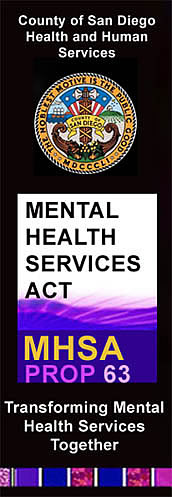

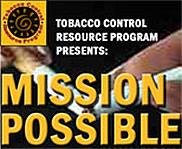

 pneumonia vaccine. The influenza season typically occurs between November and May. The flu vaccine is recommended for people age 60 and older, and younger people with chronic medical conditions. Click
pneumonia vaccine. The influenza season typically occurs between November and May. The flu vaccine is recommended for people age 60 and older, and younger people with chronic medical conditions. Click 

 Sera Plasma Collection Center officials to notify clients and staff who may have been exposed to a multi-drug resistant strain of tuberculosis (TB). This case, at Life Sera Plasma Center in Hillcrest, was reported earlier this month by HHSA.
Sera Plasma Collection Center officials to notify clients and staff who may have been exposed to a multi-drug resistant strain of tuberculosis (TB). This case, at Life Sera Plasma Center in Hillcrest, was reported earlier this month by HHSA. diabetes?
diabetes?  deaths linked to inappropriate use of UCB's prescription cough medicine Tussionex.
deaths linked to inappropriate use of UCB's prescription cough medicine Tussionex.
 cancer is largely preventable, treatable and beatable. In conjunction with National Colorectal Cancer Awareness Month, the Centers for Medicare & Medicaid Services (CMS) remind health care professionals that Medicare provides coverage for certain colorectal cancer screenings. Colorectal cancer affects both men and women of all racial and ethnic groups, and is most often found in people aged 50 years or older. And the risk for developing colorectal cancer increases with age.
cancer is largely preventable, treatable and beatable. In conjunction with National Colorectal Cancer Awareness Month, the Centers for Medicare & Medicaid Services (CMS) remind health care professionals that Medicare provides coverage for certain colorectal cancer screenings. Colorectal cancer affects both men and women of all racial and ethnic groups, and is most often found in people aged 50 years or older. And the risk for developing colorectal cancer increases with age.  operation. The market is a collaboration of neighbors, businesses and community-based/social services organizations. It will be the first Electronic Benefit Transfer (EBT) accessible market inSan Diego County, and one of a handful located in low-income neighborhoods. The market will be managed by the Farm Bureau of San Diego County, and the International Rescue Committee San Diego will be the community programming lead agency.
operation. The market is a collaboration of neighbors, businesses and community-based/social services organizations. It will be the first Electronic Benefit Transfer (EBT) accessible market inSan Diego County, and one of a handful located in low-income neighborhoods. The market will be managed by the Farm Bureau of San Diego County, and the International Rescue Committee San Diego will be the community programming lead agency. Federation membership during the Annual Conference in Washington, D.C., December 9, 2007. Her charge is focused on addressing the issue that too many times tragic outcomes result from law enforcement's response to children and youth in mental health crisis. She charged all members to build upon the very promising and collegial relationship built between the National Federation and the International Association of Chiefs of Police.
Federation membership during the Annual Conference in Washington, D.C., December 9, 2007. Her charge is focused on addressing the issue that too many times tragic outcomes result from law enforcement's response to children and youth in mental health crisis. She charged all members to build upon the very promising and collegial relationship built between the National Federation and the International Association of Chiefs of Police. 
